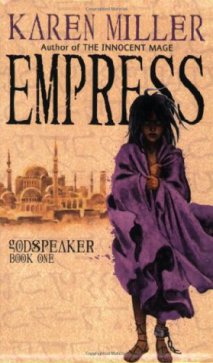
Every book has… an atmosphere. It’s formed by the style of the writing, the use of dialogue, the density of the paragraphs. Atmosphere isn’t quite the right word; my vocabulary falls short, but it’s very much a feeling, as one reads, that is woven together and sustained by the skill of the writer as a storyteller. The feeling I get while reading Empress is one of discomfort, of an oppressive heat bearing down on me. This is no doubt deliberate; the setting of the opening chapter is a sweltering, parched land inhabited by a people who value their women less than cattle.
Protagonist Hekat, who names herself when she is purchased by a passing slave trader, has internalised this same misogyny; women are weak, girls are “she-brats”, failure to birth a boy is punishable with death by stoning. Within this first chapter the slurs “bitch,” “slut,” and the more inventive “goatslit” are all used. Hekat’s mother is raped by her husband in front of her daughter, and Hekat herself, aged only twelve, is digitally raped by a slave trader seeking to see whether she is “intact.” It’s brutal, unforgiving stuff. This is not a cosy book.
A single chapter is not enough to conclude whether or not this gruesome display of misogyny will be challenged and appropriate vengeance wrought; it is perfectly feasible for women authors to write works which collude in sexist practices. The extremity of it, though, the sheer violence, makes it hard to imagine Miller is going to narratively advocate for it. The treatment of misogyny as a barbaric practice will require the dichotomy of more “refined” misogyny from “civilised” individuals to demonstrate its true nuance and permeability in society – fictional or otherwise.
Rating? powerful, hard going, but potentially worth it
Keep Reading? yes, but likely in small doses
Order a copy of Empress from Hive and choose a local bookshop to support along the way.
Advertisements Share this:




